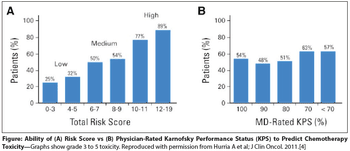
In this video, Dr. Arti Hurria discusses resources addressing the disconnect between cancer as a growing problem in the elderly and the fact that clinical trials mostly enroll younger patients.

Your AI-Trained Oncology Knowledge Connection!


In this video, Dr. Arti Hurria discusses resources addressing the disconnect between cancer as a growing problem in the elderly and the fact that clinical trials mostly enroll younger patients.

Cognitive dysfunction during and following treatment for cancer, often referred to as “chemobrain,” is an adverse effect of cancer treatment that may interfere with patients’ ability to resume their precancer lifestyle, with subsequently reduced quality of life.

Making appropriate treatment decisions for older adults with cancer is one of the most important challenges that oncologists face in daily practice, as the therapy selected depends on an assessment of the patient’s “fitness.”

The population of the United States and other industrialized nations is aging rapidly. The increased life span allows for longer exposure to carcinogens and the accumulation of genetic alterations. Thus, the incidence of cancer is increasing along with the aging of the population.

The risk of cancer increases with age, and as the US population rapidly ages, the number of older adults seeking treatment for cancer is also increasing dramatically. However, this growing population of older adults has been underrepresented in clinical trials that set the standards for oncology care. In addition, most clinical trials conducted to date have not addressed the problems that accompany aging, including reduced physiologic reserve, changes in drug pharmacokinetics, and the impact of comorbid medical conditions and polypharmacy on treatment tolerance. As a result, there are variations in treatment patterns between older and younger adults and few evidence-based guidelines accounting for the changes in physiology or pharmacokinetics that occur with aging. This article examines the demographics of cancer and aging, the barriers to enrollment of older adults on clinical trials, and approaches for future trials to address the needs of the older patient.

Drs. Basche and Kelly presentan excellent comprehensivereview of the treatment ofnon–small-cell lung cancer in olderpersons. Articles such as this, whichfocus on the older patient, are of paramountimportance for several reasons.First, cancer is a disease ofaging, with an 11-fold increased incidenceand a 16-fold increase in cancer-related mortality among patientsover age 65 compared to those under65.[1] Second, the population is aging,and in the year 2030, approximately22% will be over 65.[1] Third,data on older cancer patients are limitedsecondary to an underrepresentationof this population in clinicaltrials.[2,3] Based on these facts, acomprehensive review of the availabledata is important, especially toguide future research.

Published: January 1st 2003 | Updated:

Published: July 15th 2014 | Updated:

Published: July 1st 2008 | Updated:

Published: March 1st 2007 | Updated:

Published: September 15th 2014 | Updated:

Published: July 5th 2018 | Updated: